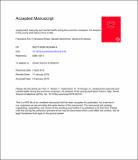Files in this item
Employment insecurity and mental health during the economic recession : an analysis of the young adult labour force in Italy
Item metadata
| dc.contributor.author | Fiori, Francesca | |
| dc.contributor.author | Rinesi, Francesca | |
| dc.contributor.author | Spizzichino, Daniele | |
| dc.contributor.author | Giorgio, Ginevra Di | |
| dc.date.accessioned | 2018-02-10T00:31:18Z | |
| dc.date.available | 2018-02-10T00:31:18Z | |
| dc.date.issued | 2016-03 | |
| dc.identifier | 240912640 | |
| dc.identifier | e9219e8f-772e-441a-811c-670f8a55aad4 | |
| dc.identifier | 84957895305 | |
| dc.identifier | 000372937500011 | |
| dc.identifier.citation | Fiori , F , Rinesi , F , Spizzichino , D & Giorgio , G D 2016 , ' Employment insecurity and mental health during the economic recession : an analysis of the young adult labour force in Italy ' , Social Science and Medicine , vol. 153 , pp. 90-98 . https://doi.org/10.1016/j.socscimed.2016.02.010 | en |
| dc.identifier.issn | 0277-9536 | |
| dc.identifier.other | Bibtex: urn:faaedd3748cd7bc2072c5b39ab0402c8 | |
| dc.identifier.uri | https://hdl.handle.net/10023/12698 | |
| dc.description.abstract | Background and objective. A growing body of scientific literature highlights the negative consequences of employment insecurity on several life domains. This study focuses on the young adult labour force in Italy, investigating the relationship between employment insecurity and mental health and whether this has changed after years of economic downturn. It enhances understanding by addressing differences in mental health according to several employment characteristics; and by exploring the role of respondents’ economic situation and educational level. Data and Methods. Data from a large-scale, nationally representative health survey are used to estimate the relationship between employment insecurity and the Mental Health Inventory (MHI), by means of multiple linear regressions. Results and Conclusions. The study demonstrates that employment insecurity is associated with poorer mental health. Moreover, neither temporary workers nor unemployed individuals are a homogeneous group. Previous job experience is important in differentiating the mental health risks of unemployed individuals; and the effects on mental health vary according to occupational status and to the amount of time spent in a condition of insecurity. Further, the experience of financial difficulties partly explains the relationship between employment insecurity and mental health; and different mental health outcomes depend on respondents’ educational level. Lastly, the risks of reporting poorer mental health were higher in 2013 than in 2005. | |
| dc.format.extent | 520677 | |
| dc.language.iso | eng | |
| dc.relation.ispartof | Social Science and Medicine | en |
| dc.subject | Employment insecurity | en |
| dc.subject | Mental health | en |
| dc.subject | Young adult labour force | en |
| dc.subject | Italy | en |
| dc.subject | Economic recession | en |
| dc.subject | HB Economic Theory | en |
| dc.subject | HC Economic History and Conditions | en |
| dc.subject | 3rd-NDAS | en |
| dc.subject | SDG 3 - Good Health and Well-being | en |
| dc.subject.lcc | HB | en |
| dc.subject.lcc | HC | en |
| dc.title | Employment insecurity and mental health during the economic recession : an analysis of the young adult labour force in Italy | en |
| dc.type | Journal article | en |
| dc.contributor.institution | University of St Andrews. Geography & Sustainable Development | en |
| dc.identifier.doi | 10.1016/j.socscimed.2016.02.010 | |
| dc.description.status | Peer reviewed | en |
| dc.date.embargoedUntil | 2018-02-09 |
This item appears in the following Collection(s)
Items in the St Andrews Research Repository are protected by copyright, with all rights reserved, unless otherwise indicated.

